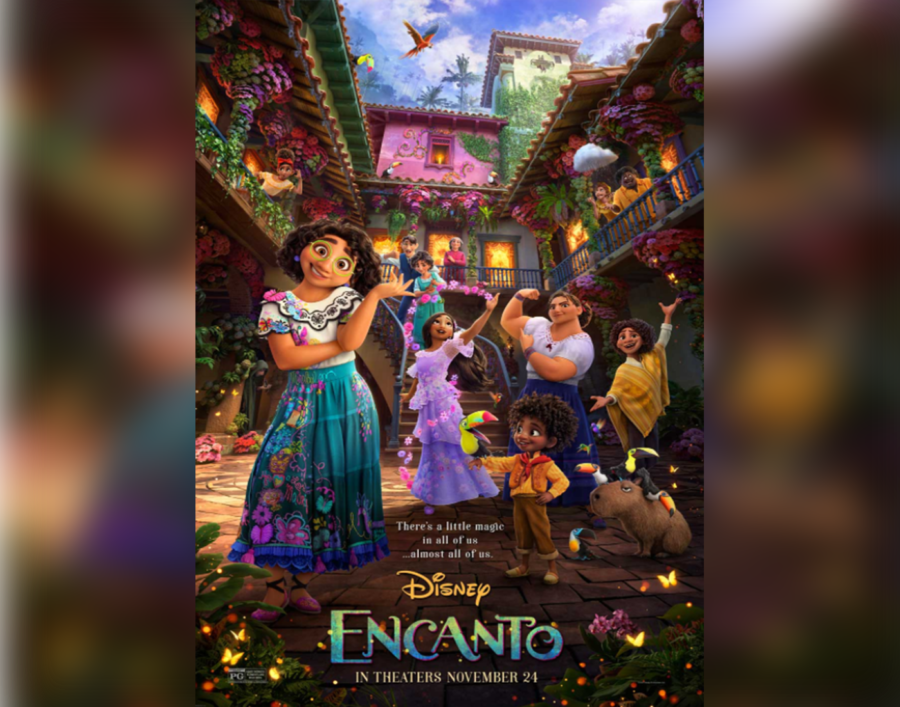Disney’s Encanto highlights generational trauma in immigrant families
January 18, 2022
Disney’s newest animated movie Encanto premiered on Nov. 24, 2021 and just recently on Disney+ on Dec. 24, 2021. The Encanto voice actor cast is lined up with many famous Hispanic celebrities such as: Stephanie Beatriz, Jessica Darrow, Diane Guerrero, John Leguizamo, Maluma and Carolina Gaitán to name a few. Not only was the cast lined up with many popular actors and singers, but the soundtrack was written by Tony and Grammy winning singer-songwriter Lin-Manuel Miranda. Encanto currently has a 91% rating on Rotten Tomatoes, but even with that score Encanto did not fare well with revenue; so far only making $92.5 million since its release.
The movie is set in the mountains of Colombia and follows the main character Mirabel Madrigal as she tries to be herself whilst being the only non magical child in a family blessed by the encanto, a magic that gives every child born into the family a magical gift. Not only is the family blessed with amazing abilities but their house, which is often referred to as Casita, is full of magic powers and treated as a member of the family. Throughout the story, we are introduced to the members of the Madrigal family and their gifts, quickly the audience is able to tell that Mirabel is set to be an outsider in her own family. In the movie, Mirabel starts to notice cracks in the walls and foundation of their casita, when the cracks are no longer seen the family downplays her worries and Mirabel realizes it is up to her to save their home.
Disney movies are widely known for having great soundtracks, Encanto is no different. The soundtrack has grown to become quite popular after Encantos release on Disney+. Although all songs on the soundtrack are good in their own right, fans are obsessed with the song, “We don’t talk about Bruno”, a song about the shunned black sheep of the family, Uncle Bruno, whose gift was to read prophecies. Throughout the song, members of the Madrigal family and people of the town take turns to talk about their own encounters with Bruno; most stories make him out to be a bad guy with equally bad power. The song brings many different melodies and ends with an unexpected group number where each member of the family sings their verse one last time. Encantos soundtrack is currently trending on the social media platform TikTok, the hashtag “wedonttalkaboutbruno” has short under a billion views, and more than 170 thousand videos.
Encanto becomes a relatable movie to first generation kids
The animated film has gotten lots of traction recently with numerous members of the Hispanic community praising the movie’s deeper meaning portrayed through the music and storyline. The movie was originally made to be related to by first generation Hispanics, but other first generation children of different ethnic groups were able to relate to the movie in the same way.
They are able to relate with the characters own personal struggles that tie in on what it’s like to be a member of a first generation family that deals with generational trauma. Jane Medina is a sophomore and first generation child of a Mexican-Panamanian family, she said, “Personally I relate to Luisa because on the outer surface she shows her strong, cool and collected side but deep down she knows that she’s struggling under the pressure her family puts her through. Luisa’s strive for greatness comes from her family’s enormous expectations set on her, that part of her storyline reminds me of how being born in America is such a great opportunity in the eyes of many immigrants that they just expect so much from you because of it. I think they often forget how difficult it is to assimilate into a country you have no connections in.”
In the movie, viewers often see Luisa busy dealing with tasks and favors the townspeople and her family have her do, Medina pointed out how realistic Luisa’s situation is. Medina said, “Often I find myself busy doing things for my parents, things like being asked to translate documents, translate verbal conversations, calling people in place of my parents because of the language barrier, dealing with racist remarks; there’s just so much that I, as well as so many other kids with immigrant parents go through. Lots of the stuff that’s being forced on us is used to help pave the way for other generations to come, and yes it feels great helping, but that doesn’t make up for how physically and emotionally draining it is.” Luisa’s story is one that is commonly shared among the lives of first gens.
Each character in the movie is used to portray a certain aspect of struggles faced in a first generation household. Generational trauma does not just appear out of nowhere, it all comes from something, in this case it comes from Abuela. Although portrayed as the villain of the story, Abuela faced many horrific traumatic things that caused her character to build up incredibly high walls around her family. In doing this, she created unreasonable expectations that she expected everyone in her family to meet. The weight of trying to please Abuela makes the family uneasy about upsetting her, which leads them to put the good of the family in front of their own needs and wants.
The pressure put on the family is shown several different times throughout the film. An example of this is when Isabella, the oldest grandchild of the family, is expected to be the perfect golden child. Isabela must always look perfect, make perfect creations with her gift of growing plants, as well as doing things to better the family name. To keep up with the expectations set on her, Isabela was about to commit to marrying a man she did not love. Doing things for the sake of the family even though it compromises the happiness of oneself is something that many first generation children go through.
One last example of a regular situation many first generations face is the struggle of carrying all the family burden plus making yourself available to help others with their own problems. This struggle is shown in the character Luisa whose literal power is being able to carry anything no matter the weight. In the film, viewers often see Luisa being relied on by her family as well as the townspeople to accomplish hard jobs. In the song “Surface Pressure” Luisa shared what it’s like being relied on all the time, she said, “Give it to your sister, it doesn’t hurt- And see if she can handle every family burden- Watch as she buckles and bends but never breaks- No mistakes.” This line is very relatable to first generation children who do their best at keeping up with their family’s needs whilst also being expected to be perfect and make “no mistakes.” Although many problems are resolved by the end of the movie, the generational trauma still leaves a burning mark on the lives of those affected.
Disney’s new movie Encanto is a film full of representation of the Colombian-Hispanic culture and is available for streaming now on Disney+.



